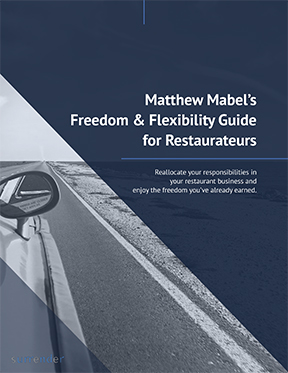
If the only way you prove your restaurant’s continued success and competitive advantage comes through using data, that’s perilous.
That’s because the most important things in our industry are hard to measure:
- Culture
- Morale
- Guest happiness
- Service
Sure, we have spent a lot of time creating metrics for each of these topics – honestly, the data proves useful.
But metrics don’t tell the whole story: because many restaurant and hospitality essentials are subjective.
I don’t have a problem with that.
Just like I don’t have a problem with a guest saying they like a restaurant and are coming back – even though they don’t present an MBA-produced, fully-tabbed spreadsheet to support their reasons.
When I design a bonus program for one of my successful, independent multi-unit clients, I know the strongest plans depend somewhat on a subjective topic.
One where the trusted owner knows in their heart whether it happened.
At first, this may upset people and make their head spin – because they’ve been taught to believe everything must have a data point attached.
Stories Eat Numbers for Breakfast
You can prove your restaurant’s outstanding results by telling compelling stories.
So we collect those stories – stories about culture, morale, guest happiness, and service:
- “Our line cook moved 10 miles farther North from our restaurant but decided to keep working here because she never felt so appreciated and connected to a group at work in her entire life.”
- “The party on table 23 just celebrated their anniversary here for the third year in a row and told us they would not think of going anywhere else because we treat them like celebrity royalty.”
Then, through training and education, we hand down the best stories and turn them into folklore.
Anecdotal evidence moves your organization in the direction of your choice in a way numeric analysis won’t.
Four Essential Steps to Using Anecdotal Evidence
- Write down a list of three important aspects of your business that you find difficult to measure numerically.
- Pick the one most important to your success.
- Start asking your people to collect anecdotal evidence – exemplary stories proving that good things are happening in your restaurants.
- Create a mechanism for collecting and disseminating the best stories.
Going around the group at pre-shift and listening to people who tell stories on the same theme creates a powerful message.
Humans have told stories since we learned to talk.
The spirit of competition makes people pay attention.
Humans competed before we learned to talk.
Anecdotal evidence underlines important aspects of your business. It harnesses the power of story, context, background, and events small and large.
Over to you. How will you use anecdotal evidence to boost guest satisfaction, revenue, profit, and employee retention?

